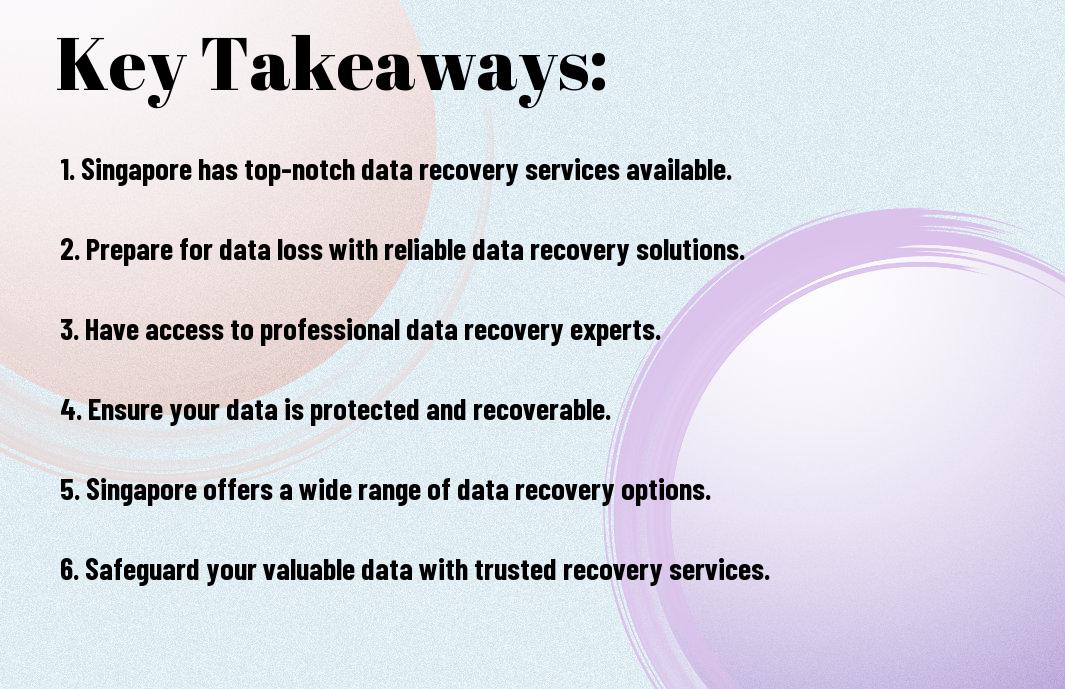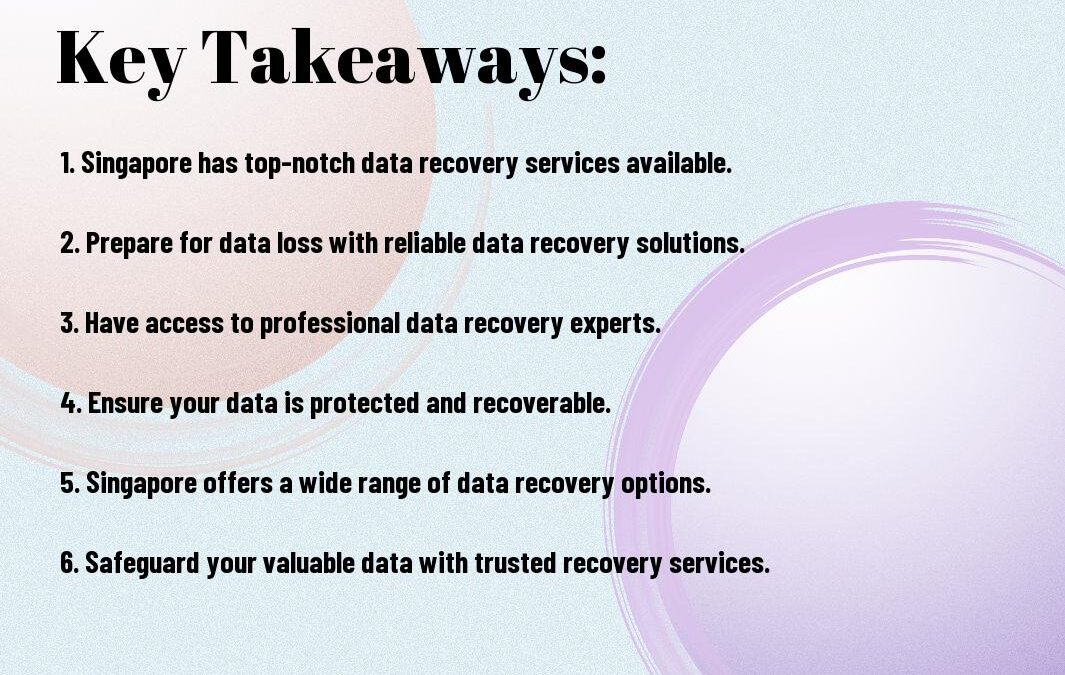Most individuals and businesses fail to realize the importance of having a solid data recovery plan until it’s too late. In today’s digital world, the danger of losing crucial data due to hardware failure, accidental deletion, or cyber attacks is ever-present. However, in Singapore, there are gems among data recovery service providers that offer top-tier solutions to help you retrieve and restore your valuable information. In this blog post, we will uncover some of Singapore’s best data recovery service providers and help you prepare for any potential data loss emergencies.
Key Takeaways:
- Singaporean Data Recovery Services: Singapore offers a variety of reliable data recovery services for individuals and businesses.
- Data Loss Preparedness: It is crucial to have a plan in place for potential data loss, including regular backups and knowledge of reputable data recovery services.
- Importance of Professional Data Recovery: Professional data recovery services have the expertise and technology to retrieve lost data effectively and securely, ensuring minimal disruption to your operations.
Understanding Data Loss
Even in today’s technologically advanced world, data loss is a common and often devastating occurrence that can affect individuals and businesses alike. It is crucial to understand the causes of data loss, as well as the misconceptions surrounding it, in order to adequately prepare for and prevent such incidents.
Common Causes
Understanding the common causes of data loss is essential in safeguarding your valuable information. Human error, such as accidental deletion or formatting of files, is one of the leading causes of data loss. Hardware malfunctions, including hard drive crashes and power surges, can also result in the loss of data. Additionally, software corruption, malware infections, and natural disasters like floods or fires can all contribute to data loss.
Misconceptions and Realities
Causes of data loss are often misunderstood, leading to misconceptions that can have serious consequences. One common misconception is that data recovery is always possible, regardless of the circumstances. In reality, the success of data recovery depends on various factors, including the cause of the data loss, the extent of damage, and the actions taken after the incident. It is important to seek professional help from data recovery experts who have the knowledge and tools to maximize the chances of recovering lost data.
Misconceptions and realities surrounding data loss can impact the effectiveness of data recovery efforts. It is crucial to debunk myths and educate individuals and businesses on the best practices for preventing and recovering from data loss incidents. By understanding the true nature of data loss and taking proactive measures, you can better protect your valuable information and minimize the risks associated with potential data loss.
Evaluating Your Risk
Obviously, data loss can happen to anyone at any time. It is essential for individuals and businesses to assess their risk of experiencing data loss and take necessary precautions to mitigate the impact.
Assessing Data Loss Vulnerabilities
Evaluating your risk starts with identifying potential vulnerabilities in your data storage systems. This includes assessing the hardware and software used to store and process data, as well as the protocols in place for data backup and recovery. Common vulnerabilities that can lead to data loss include hardware failures, software corruption, human error, and cyber threats.
It is crucial to conduct regular risk assessments to stay ahead of potential data loss scenarios. By identifying vulnerabilities and weaknesses in your data management systems, you can proactively address them and reduce the risk of experiencing data loss.
Implementing Preventive Measures
On top of assessing vulnerabilities, implementing preventive measures is key to protecting your data from loss. This includes setting up robust backup systems, implementing data encryption, and establishing access control measures to prevent unauthorized data access.
Data loss prevention strategies should be tailored to the specific needs and risks of your organization. Regularly updating and testing your data backup systems, educating employees on data security best practices, and investing in cybersecurity solutions can all help mitigate the risk of data loss.
Uncovering Singapore’s Data Recovery Services
After experiencing data loss, whether it’s due to a hardware failure, human error, or cyber attack, the next crucial step is to engage a reliable data recovery service. In Singapore, there are several key players in the data recovery industry that offer a range of services to help individuals and businesses recover their lost data.
Key Players in the Data Recovery Industry
Data recovery giants like CBL Data Recovery and Ontrack are well-established names in Singapore, known for their track record in retrieving critical data from various storage devices such as hard drives, SSDs, RAID arrays, and even mobile phones. These companies boast state-of-the-art laboratories equipped with specialized tools and cleanroom facilities to handle the most complex data recovery cases.
Other notable players in the data recovery industry in Singapore include ADRC Singapore and Data-X Recovery, which cater to both individual and corporate clients with solutions tailored to their specific needs. These companies offer a range of services, from simple file recovery to more advanced data reconstruction for damaged storage devices.
Cutting-Edge Techniques and Technologies
One of the cutting-edge techniques used by data recovery services in Singapore is the process of chip-off data recovery, where skilled technicians physically remove memory chips from a device to extract data directly. This method is particularly effective in cases where the storage device is physically damaged or inaccessible through normal means.
Industry-leading data recovery companies in Singapore also leverage advanced technologies such as machine learning algorithms and forensic tools to enhance their data recovery capabilities. These innovative approaches enable them to recover a wide range of file types and formats, ensuring a higher success rate in retrieving lost data for their clients.
The Recovery Process
To ensure successful data recovery, it is vital to understand the recovery process thoroughly. Whether you have faced hardware failure or accidentally deleted important files, knowing the steps involved can help you make informed decisions and collaborate effectively with data recovery professionals.
Step-by-Step Guide to Data Recovery
Any data recovery process typically involves the following steps:
| Assessment | Evaluation |
| Diagnosing the severity of data loss and determining the best recovery approach. | Examining the condition of the damaged storage device and analyzing recoverable data. |
Once the assessment is complete, the data recovery specialists will proceed with the required steps to retrieve and restore your lost data.
What to Expect During Data Restoration
One crucial aspect to consider during data restoration is the time frame. The duration of the recovery process depends on the complexity of the data loss scenario and the selected recovery methods. Additionally, the success rate of data recovery may vary based on the extent of damage to the storage device.
It is essential to communicate effectively with the data recovery service provider to understand the estimated timeline and the chances of successful data retrieval. By setting realistic expectations and providing all necessary information, you can enhance the recovery process’s efficiency and increase the likelihood of a positive outcome.
It is crucial to remain patient and follow the advice of the data recovery professionals throughout the restoration process. By entrusting your data to experienced specialists and cooperating closely with them, you can maximize the chances of recovering your valuable information successfully.
Preparing for the Inevitable
Your valuable data is at risk of being lost at any given moment. It is crucial to be prepared for the inevitable by implementing proper data backup solutions and strategies as well as regularly testing and maintaining your data to ensure its integrity.
Backup Solutions and Strategies
Strategies for backing up your data range from simple external hard drives to cloud-based solutions. It is recommended to have multiple backup sources to ensure redundancy and data availability in case of a disaster. Implementing a rotating backup schedule and using encryption for sensitive data can further enhance your backup strategy.
Regularly reviewing and updating your backup plan is essential to ensure it aligns with your changing data needs. It is also important to store your backups in a secure location, separate from your primary data, to safeguard against physical damage or theft.
Testing and Maintenance to Ensure Data Integrity
Testing and maintaining your backups are as critical as creating them. Regularly testing your backups by restoring data from them can identify any potential issues and ensure that your data can be recovered when needed. Additionally, performing routine maintenance such as checking for errors and updating backup software can prevent data loss due to technical failures.
With data recovery services in Singapore offering advanced tools and expertise, you can entrust them to recover your data in the event of a loss. However, proactively maintaining and testing your backups is the best way to minimize the risks associated with data loss.

Summing up
So, it is imperative to be prepared for data loss and familiarize yourself with Singapore’s data recovery service gems to ensure your valuable information is safeguarded. By understanding the importance of data recovery services and knowing the top providers in Singapore, you can rest assured that your data will be handled with the utmost care and expertise in case of any unforeseen data loss incidents. Don’t wait until it’s too late, take the necessary steps today to protect your data and minimize any potential risks.
FAQ
Q: What are the common causes of data loss?
A: Data loss can occur due to various reasons such as hardware failure, human error, software corruption, viruses or malware, natural disasters, power surges, and theft.
Q: How can I prevent data loss?
A: To prevent data loss, you should regularly back up your important data, use reliable antivirus software, avoid opening suspicious emails or clicking on unknown links, keep your software updated, use surge protectors, and store your backups in a secure location.
Q: What should I do if I experience data loss?
A: If you experience data loss, stop using the affected device immediately to prevent further damage. Contact a professional data recovery service in Singapore to evaluate the situation and attempt to recover your lost data. Do not attempt to recover the data yourself as this may cause irreparable damage.

